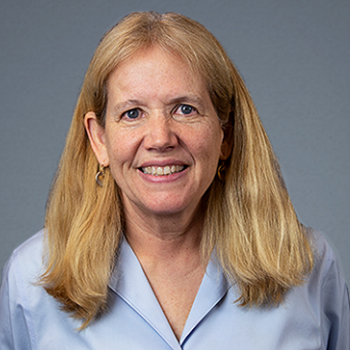Laurie Goodyear, PhD, MS
-
Researcher
-
Integrative Physiology and Metabolism
Senior Investigator
Section Head, Integrative Physiology and Metabolism
Director, Animal Physiology Core
Professor of Medicine, Harvard Medical School
Dr. Goodyear is a leader in the field of cellular signaling in skeletal muscle, including groundbreaking work on AMPK and the elucidation of numerous contraction-stimulated signaling networks. She is continually translating her research from cells to mice to humans. Her research is highly cited and she has been continuously funded by the NIH and other organizations throughout her career. Dr. Goodyear has served on numerous national and international committees and panels for grant and editorial review, and trained over 100 post-doctoral fellows and students, many of whom currently hold key professorial academic positions in the US and abroad.
Dr. Goodyear has been the recipient of several awards including Career Development Awards from the American Diabetes Association and Juvenile Diabetes Foundation, a New Investigator Award from the American College of Sports Medicine, and the 2012 Edward F. Adolph Distinguished Lectureship of the American Physiological Society. She has published more than 175 papers and has had the honor of giving over 100 invited lectures at national and international conferences.
Physical exercise is widely accepted as a clinically important modality to decrease blood glucose concentrations in patients with Type 2 diabetes. Although people with Type 2 diabetes are resistance to the actions of insulin in skeletal muscle, in contrast, exercise can result in normal or near normal increases in glucose uptake into the working skeletal muscles. In addition, exercise can dramatically increase the sensitivity of the muscle to the actions of insulin. Despite the profound clinical importance of the metabolic effects of exercise, until recently there has been little focus on the underlying molecular mechanisms that mediate these responses, as well as linking these effects to human physiology. Work in the Goodyear lab has uncovered many of the basic mechanisms that underlie the effects of exercise on metabolism, and has successfully translated many of these findings into humans. For example, the laboratory has elucidated mechanisms through which single bouts of exercise increase glucose uptake in skeletal muscle, and mechanisms by which chronic exercise training improves overall metabolic homeostasis. The Goodyear lab has shown that exercise increases glucose uptake in muscle through intracellular signal transduction mechanisms that are distinct from those used by insulin. The lab has identified AMPK as a mediator of insulin-independent glucose transport in skeletal muscle, and has also shown that the AMPK-related kinase SNARK also plays a fundamental role in the response to exercise. These studies have contributed to worldwide interest in AMPK and the AMPK family of protein kinases as master regulators of metabolic and transcriptional functions in tissues and cells throughout the body.
The Goodyear laboratory has recently discovered that exercise has other health benefits that were previously unrecognized. They have shown that maternal exercise can impact the metabolic health of offspring, even as the offspring themselves become adults. This exciting finding has potential major ramifications for human health, and the role of intergenerational factors in predispositions to diabetes and obesity. Another fascinating area of research in the laboratory has been the identification of novel myokines and adipokines that play an important role in metabolic responses to exercise, and the role of adipose tissue in training-induced increases in glucose homeostasis. In a totally unexpected finding, they have shown that exercise training causes adaptations to subcutaneous white adipose tissue that result in secretion of adipokines that, in turn, function to improve whole body and skeletal muscle glucose homeostasis. These novel discoveries have opened up new areas of exercise biology.

